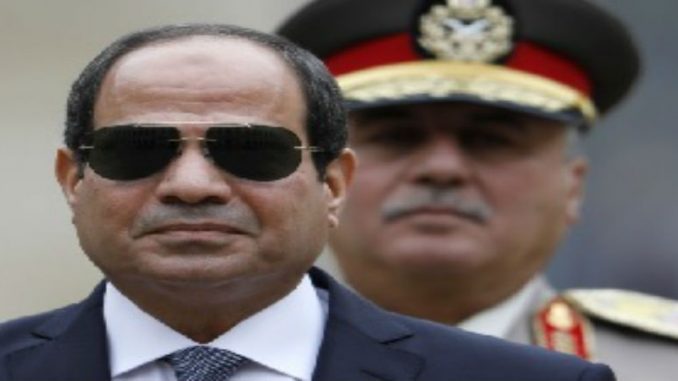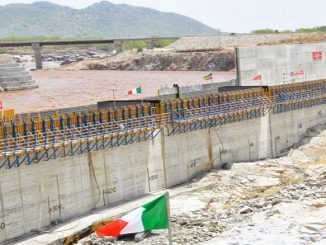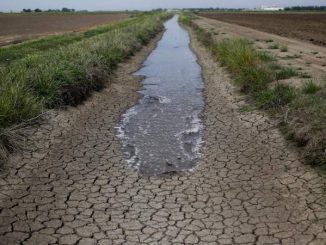
Egypt’s al-Sisi delivered a stern warning to Ethiopia over the Renaissance Dam after the two countries along with Sudan failed to approve a study on its potential effects.
Ethiopia is about to finalize the construction of the Grand Ethiopian Renaissance Dam, its first major dam on the Blue Nile. Once it starts filling the dam, the GERD will be the giant reservoir behind it to power the Africa’s largest hydroelectric dam.
Egypt fears that its water shares will be affected destroying parts of its farmland and squeezing its population of 94 million people, who already face water shortages.
The Nile provides over 90 %of Egypt’s water supply. It already receives the lion’s share of Nile waters — more than 55 billion of the around 88 billion cubic meters of water that flow down the river each year.
Last week, Cairo said that the three countries had failed to approve an initial study by a consultancy firm on the dam’s potential effects on Egypt and Sudan.
In response, Ethiopia advocated its stance saying that the dam is essential to its development and has repeatedly sought to reassure Egypt. However, Cairo’s efforts to persuade Addis Ababa to engage in closer coordination over the dam appear to have made little headway.
In a televised comments while attending the inauguration a fish farm in the Nile Delta province of Kafr el-Sheikh, Al-Sisi sought to reassure Egyptians but stressed that “water is a matter of life or death.” He said, “No one can touch Egypt’s share of water.”
Al-Sisi used a news conference at the Red Sea resort of Sharm el-Sheikh on November 8 to deliver the same message to Ethiopia.
He said,”We view positively the developmental needs of our friends and brothers in Ethiopia,” then added “We are capable of protecting our national security and water to us is a question of national security. Full stop.”
Al-Sisi did not say how Egypt intended to proceed. The government has publicly ruled out military action, but top Egyptian officials have in recent months been sharpening their rhetoric on Ethiopia.
Al-Sisi has sought to foster better ties with sub-Saharan Africa, especially fellow Nile basin countries, insisting that while his country needs its full share of the river’s waters, it is ready to help them with their economic development.
Despite al-Sisi’s reassurance to the Egyptians, some media outlets believe that he was part of the catastrophe.
In 2016, an Egyptian newspaper unveiled what it considered as “Entebbe Scandal” pointing that Israel has mediated between Egypt and Ethiopia in the negotiations regarding the “Renaissance Dam”.
The mediation was within the framework of a deal that would end up with Egypt’s abandoning of its historical rights in the Nile River by its acceptance to the Entebbe agreement that was previously rejected by the overthrown President Hosni Mubarak, reported Arabi 21.
In the same context, Veto newspaper said that 5 months were enough for Ethiopia to end its “tug of war” game with Egypt during its negotiations in February 2016, ending in favor of Ethiopia as usual as Egypt expressed its surprise that the first phase of the Renaissance Dam had ended, but finally surrendered.
According to the newspaper, Egypt’s surrender was clear when Egypt’s Prime Minister Sherif Ismail held a meeting of the Egyptian water committee in June 2016, deciding that Egypt will attend the meeting of the Nile basin countries after six years of absence.
Many observers were surprised but what happened afterwards explained the real picture of what can be called, “the deal for resuming Renaissance dam negotiations”, according to the newspaper.
The newspaper unveiled that the first condition in the deal was Egypt’s presence in the Nile basin countries meetings which it previously boycotted in protest against Entebbe agreement. Entebbe agreement calls for dividing the Nile water shares regardless of the historical background, which was considered at that time by the overthrown President Hosni Mubarak as a declaration for Egypt’s loss of its water rights.
According to Entebbe agreement, the Nile water should be divided fairly between the Nile basin countries, which Egypt-which controls 90% of the Nile River together with Sudan, to insist on boycotting the meetings of the Nile basin countries.
The newspaper continued,” It wasn’t only a political boycott but also an economic one, as Egypt’s absence means that it won’t provide any financial grants to these countries, the condition that panicked the Nile basin countries. However, they have found the negotiations on the Renaissance dam paper as means for forcing Egypt to return to Entebbe without conditions or any changes as Egypt has previously wanted.”
According to the sources inside the technical committee of the Renaissance Dam, the return of Egypt to Nile basin countries meetings was highlighted during the last technical negotiations.
At that time, the former Minister of Irrigation Hossam Moghazi announced at the time that Egypt had the will to return to the Nile basin meetings,which angered Sameh Shoukry-Egypt’s Foreign minister who asked the minister to be cautious in his statements.
However, Moghazi was dismissed in the latest ministerial changes in March, whereas the deal is still there but this time from the foreign ministry itself according to the same sources.
The sources said that the Egypt withdrew from its previous stance and accepted its return to the Nile Basin countries meetings after the executive steps that have been taken by Ethiopia to end the first phase of the dam. As a result, Egypt had no choice but to accept.
The same sources said that the return to Entebbe was not surprising pointing that Egypt always sought mediation with Ethiopia to push the negotiations that have been in stalemate for months and to end the technical studies before Ethiopia ends the second phase of the dam.
There is no doubt that Egypt’s presence in the Nile Basin countries’ meeting is a kind of recognition of Entebbe agreement’s legitimacy to pave the road for other practical steps in the coming time.



